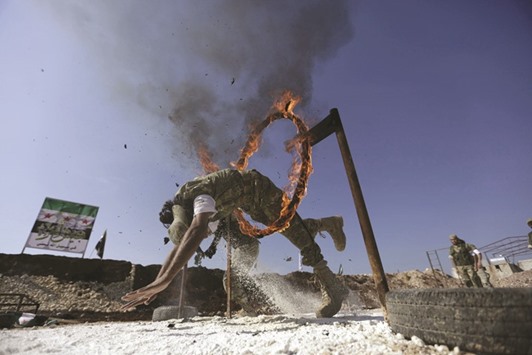The UN yesterday voiced concern over stalled aid deliveries to besieged areas in Syria, with convoys delayed or surgical equipment being removed, mainly by government forces.
Jan Egeland, chairman of a task force on humanitarian aid, urged countries such as Russia, Iran, China and Iraq to pressure Syrian President Bashar al-Assad’s government to enable more deliveries of food and medicines.
“We still have not gotten access, a green light to go at all to Douma, Daraya, east Harasta,” he told reporters after major and regional powers in the International Syria Support Group (ISSG) met to review progress during the month-long ceasefire.
More than 90,000 people in need are trapped in government-besieged Douma, while conditions are “horrendous” in Daraya, where the World Food Programme (WFP) has said some hungry people have been reduced to eating grass.
The UN has reached 150,000 people living in 11 of 18 besieged areas in Syria, out of a total of nearly 500,000 trapped in such locations.
Rebel forces are besieging Foua and Kefraya, two Shia villages in Idlib that have received multiple convoys. The rest are besieged by the government or allied Hezbollah forces, except for Deir al-Zor, encircled by Islamic State militants.
The government last week granted permission for three more besieged areas - Irbin, Zamalka and Zabadani - but the deliveries have yet to happen amid wrangling over the number of beneficiaries, Egeland said.
He said Damascus has been less responsive to requests for aid convoys than it was after world powers agreed in Munich in early February to a cessation of hostilities to allow aid to be delivered.
“It’s like there are less answers, less quick answers, less momentum, less dynamics in the situation than we had immediately after the ministerial meeting in Munich,” he said. “We must be able to get to the remaining besieged areas.”
Medical supplies and health services are being denied, in violation of international law, Egeland said.
“Surgical equipment is still taken off convoys, medical personnel is still not allowed into the besieged areas and medical evacuations are still not allowed.”
Egeland said three children in government-besieged Madaya bled to death earlier this week because they could not be evacuated for medical treatment after an unexploded bomb they were playing with exploded.
“Those children should have been alive today,” he said.
But the UN now had clearance to start air drops of vital supplies to Deir al-Zor, a town of 200,000 people, within two weeks, after a failed attempt last month, he added.
Iraqi forces advance on town held by Islamic State
Iraq’s counter-terrorism forces backed by army troops and US-led coalition air strikes advanced yesterday towards the western town of Hit in an attempt to dislodge Islamic State militants, the military said.
A senior officer from the counter-terrorism forces, the elite US-trained units which led the recapture of nearby Ramadi three months ago, said his troops were one kilometre from the town centre, 130km west of Baghdad.
The recapture of Hit, strategically located on the Euphrates River near Ain al-Asad air base where several hundred US forces are training Iraqi army troops, would push Islamic State further west towards the Syrian border, cutting a connection to the northern town of Samarra and leaving Falluja their only stronghold near the capital.
Baghdad has had success in pushing back the militants in recent months and has pledged to retake the northern city of Mosul later this year, but progress has often been fitful.
Another officer, on a frontline less than 3km from Hit, said the operation had begun at 0600 (0300 GMT) and was progressing swiftly.
“There are some IEDs along the movement but it’s still good to go and we are moving,” he said by phone from the frontline.
In a statement announcing the advance, the military said the offensive was backed by airstrikes from the Iraqi army and air force as well as the international coalition fighting Islamic State in the areas of Iraq and neighbouring Syria where the militants declared a “caliphate” in 2014.
The statement called on civilians in Hit, thought to number in the tens of thousands, to move away from Islamic State positions: “Those targets will be destroyed”.
The militants have regularly used civilians as human shields, a tactic aimed at slowing the advance of Iraqi forces and complicating air strikes essential to the ground advance.

A rebel Syrian fighter jumps through a fire loop during a military display as part of a graduation ceremony at a camp in the north of Hama province.
